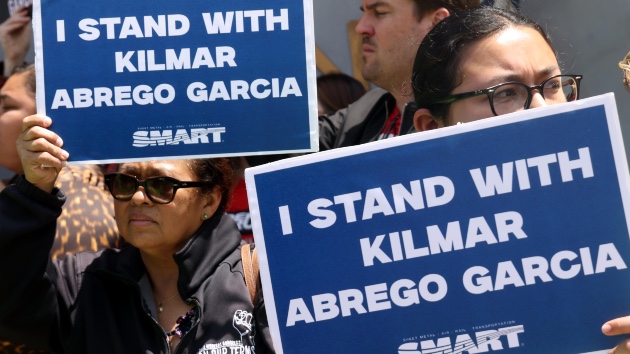
(NEW YORK) -- The federal judge overseeing Kilmar Abrego Garcia's wrongful deportation case in Maryland has denied the Trump administration's request to dismiss the case.
U.S. District Judge Paula Xinis, at a hearing Monday in Maryland, pressed DOJ attorneys on why they claimed in May court filings that they could not return Abrego Garcia to the U.S. after securing an indictment against him in Tennessee on charges of human smuggling.
"Your client secured an indictment against Mr. Abrego Garcia on May 21 ... how could you six days later say you had no power to produce him?" Judge Xinis asked. "Why else would you file a criminal indictment against someone who you can't produce? It's illogical."
Abrego Garcia, who was deported in March to El Salvador's CECOT mega-prison despite a 2019 court order barring his deportation to that country due to fear of persecution, was brought back to the U.S. last month to face charges in Tennessee of allegedly transporting undocumented migrants within the U.S. while he was living in Maryland. He has pleaded not guilty.
Judge Xinis, pointing to a filing submitted by the DOJ in May that said the U.S. government did not have the power to bring Abrego Garcia back from detention in El Salvador, repeatedly asked DOJ layers about the timeline of the criminal probe and whether the Tennessee indictment played a role in his release.
"Those are powerful arguments to say 'I don't have the power'... yet, at the same time, you're putting in place the power of the prosecutorial arm to charge an individual, who you say will never come back to the United States, with a crime," Judge Xinis said.
"You began a criminal investigation ... on April 28, which was a month after this case began, and common sense would dictate that the only possible defensible use of investigative criminal resources would be if you eventually secured an indictment to bring Mr. Abrego Garcia back," Judge Xinis said.
When DOJ attorney Bridget O'Hickey said the investigation into Abrego Garcia in Tennessee did not begin on April 28, Judge Xinis said the attorney was contradicting the government's sworn testimony in the criminal case.
"That's noteworthy to me, because I do believe that your client has taken a different position in front of the Tennessee court," Judge Xinis said.
O'Hickey said Abrego Garcia was not indicted "with the purpose of bringing him back."
"He was indicted because he was under investigation for those criminal charges," O'Hickey said.
When Judge Xinis asked the plaintiffs how they found out Abrego Garcia was returned to the U.S., Simon Sandoval-Moshenberg said, "We found out on ABC News."
Judge Xinis was also scheduled to hear arguments Monday over whether Abrego Garcia should be transferred to Maryland as he awaits trial in Tennessee.
Abrego Garcia's attorneys filed an emergency motion last week seeking to have him returned to Maryland as he awaits trial, but government attorneys say they will seek to deport him to a country other than his native El Salvador, where he is prohibited from being sent due to a 2019 court order.
The magistrate judge overseeing the Tennessee case is expected to release him on bond as he awaits trial, setting up a battle over his potential removal.
In a court filing last week, Abrego Garcia's attorneys said he had been subjected to severe mistreatment including "beatings, severe deprivation, inadequate nutrition and psychological torture" while he was held in CECOT, arguing that he "could face persecution or torture if removed directly to various other countries, including but not limited to countries with notorious human rights abuses like Libya, South Sudan, and Eritrea."
The next hearing in Abrego Garcia's criminal case is set for July 16 in Tennessee.
Robert McGuire, acting U.S. attorney for the Middle District of Tennessee, filed a motion last week to set a jury trial date "within 70 days of his initial appearance."
Copyright © 2025, ABC Audio. All rights reserved.

